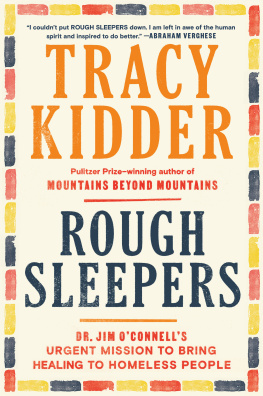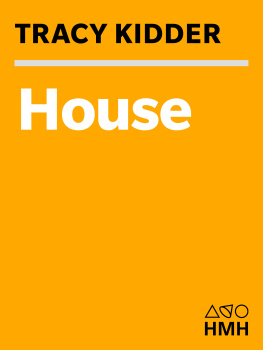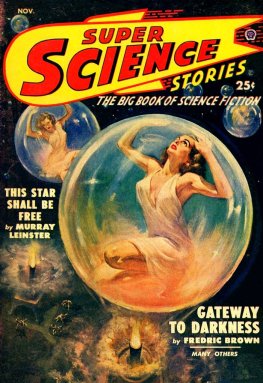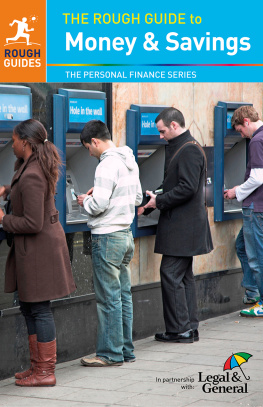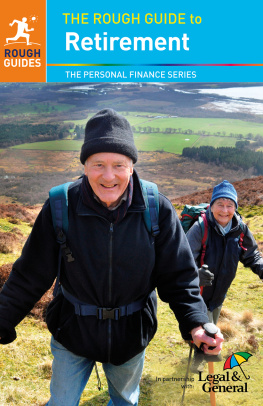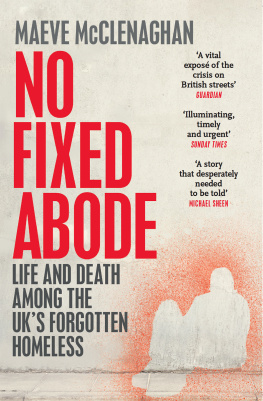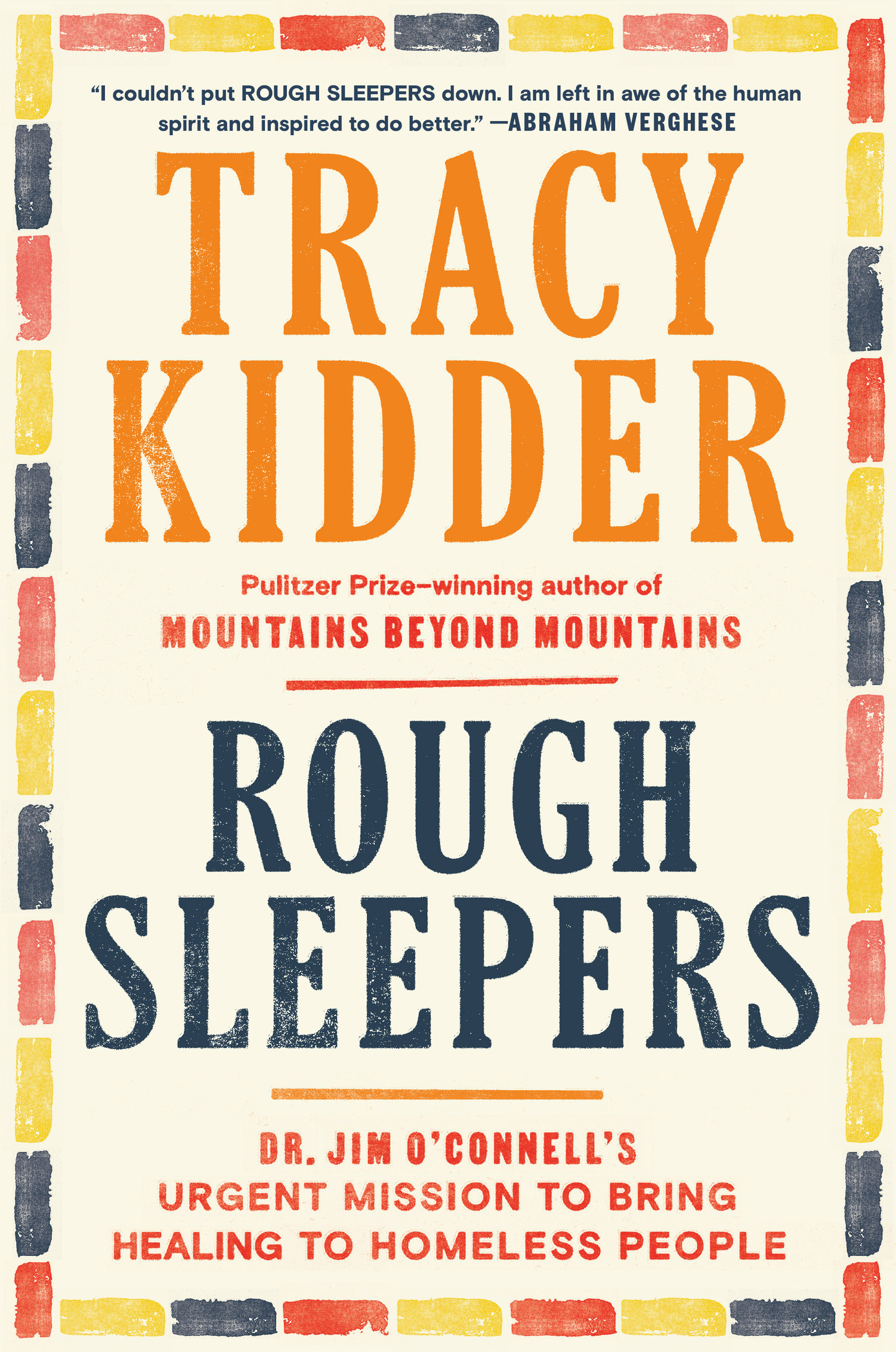Contents
Landmarks
Print Page List
Copyright 2023 by John Tracy Kidder
All rights reserved.
Published in the United States by Random House, an imprint and division of Penguin Random House LLC, New York.
Random House and the House colophon are registered trademarks of Penguin Random House LLC.
Grateful acknowledgment is made to the following for permission to reprint previously published material:
Jim OConnell, M.D.: Prescription for Housing by Jim OConnell, M.D.
Reprinted by permission of Jim OConnell, M.D.
Ben Tousley: Excerpt from A Song for Barbara by Ben Tousley.
Reprinted by permission of Ben Tousley.
Library of Congress Cataloging-in-Publication Data
Names: Kidder, Tracy, author.
Title: Rough sleepers: Dr. Jim OConnell and his quest to create a community of care / Tracy Kidder.
Description: First edition. | New York: Random House, [2023]
Identifiers: LCCN 2022017445 (print) | LCCN 2022017446 (ebook) | ISBN 9781984801432 (hardcover) | ISBN 9781984801449 (ebook)
Subjects: LCSH: OConnell, James J. (James Joseph), 1948 | Homeless personsServices forMassachusettsBoston. | Homeless personsCareMassachusettsBoston. | HomelessnessMassachusettsBoston.
Classification: LCC HV4506.B67 K54 2023 (print) | LCC HV4506.B67 (ebook) | DDC 362.5/920974461dc23/eng/20220420
LC record available at lccn.loc.gov/2022017445
LC ebook record available at lccn.loc.gov/2022017446
Ebook ISBN9781984801449
randomhousebooks.com
Book design by Susan Turner, adapted for ebook
Cover design: Alex Merto
ep_prh_6.0_142395937_c0_r1
Contents
_142395937_
Keep watch, dear Lord, with those who watch or work or weep this night, and give your angels charge over those who sleep.
Attributed to Saint Augustine
I Am
I am sometimes upfront
I am sometimes off-centered
I am sometimes concealed by myself
I am sometimes not even friggin there
I am strong as an oak and weak as an acorn
I am a child, love me
I am a boy, take my hand
I am a soldier, so please understand
I am peaceful and proud, humble yet arrogant
I am calm, yet violent
I am quiet, yet thunderous
So if we should meet for a moment on my lifes journey
Smile at me, talk to me, or simply be still
And know that I am.
Michael Frada ,
U.S. Army veteran and for many years a patient of the Street Team
Authors Note
I have changed the names of many patients.
The following names are pseudonyms, listed under the headings of chapters in which they first appear:
The Van: Johnny, Charlie, Nick, Sandy, Jerry, Jane, Manny, Lou Anne, Allegra, Arnold, Caroline, Jacqueline, Jack
Foot Soaking: Mr. Carr
Disaster Medicine: Bill, Gary, Santo
A New Face: Tony Columbo
The Street Team Meeting: Bo, Mack, Joe Z
Angels Without Wings: Johnny Smith, Harrison, David
No Loud Voices: Art
Death by Housing: BJ
A History of Tony: Isaac
The Social Director: Sally, Timmy, Andy, Jackie, Jane
Winter Comes: Rocky, Angie
The Beauty of Human Connection: Harmony, Jake
Sisyphus: Ronnie, Rabbit, Leon
The Gala: Rebecca
The Hug: John Jones
The Portrait Gallery: Kay, Lena, James Smith, Jimmy Dagget, Jonah Daniel, Bob, Jack, Nat, Dawn, Phyllis, Matthew, Gretel
Around ten on a warm September night, the outreach van stopped in the kind of South Boston neighborhood said to be in transition. On one side of the street was a new apartment building, its windows glowing, its sidewalk lit by artful imitations of old-fashioned streetlamps. On the other side, in murky light, stood an abandoned loading dock. A heap of blankets lay on the concrete platform. Someone passing by wouldnt have known they were anything but discarded blankets. But when the driver of the van walked up the steps and spoke to them, saying he was doing a wellness check, a muffled voice came back from underneath: Fuck you. Get the fuck outa here.
The driver turned away and shrugged to Dr. Jim OConnell, who was standing at the bottom of the steps. Let me try, the doctor said, and he climbed up to the platform and knelt by the gray mound. Hey, Johnny. Its Jim OConnell. I havent seen you in a long time. I just want to make sure youre all right.
An earthquake in the blankets, then an eruption: Tangled hair and a bright red face and a loud voice, saying in a Boston accent, Doctah Jim! How the fuck are ya!
For the next half hour, Johnny reminiscedabout the alcohol-fueled adventures of his past, about mutual old friends, mostly dead. The doctor listened, laughing now and then. He reminded Johnny that the Street Clinic was still open on Thursdays at Mass General. Johnny should come. That is, if he wanted to come.
Dr. JimJames Joseph OConnellhad been riding on the outreach van for three decades. During those years he had built, with many friends and colleagues, a large medical organization, which he called the Program, short for the Boston Health Care for the Homeless Program. It now had four hundred employees and looked after about eleven thousand homeless people a year. Jim was its president, and also captain of the Street Team, a small piece of the Program, with eight members serving several hundred homeless people who shunned the citys many shelters and lived mainly outside or in makeshift quarters. About half of Jims administrative work now lay in managing the Street Team, and all of his clinical work went to doctoring its patients, Bostons rough sleepers, as Jim liked to call them, borrowing the British term from the nineteenth century.
The van was a crucial tool for reaching those patients. It was financed in part by the state and managed by the Pine Street InnBostons largest homeless shelter. Nowadays two vans went out from the Inn each night. They had become an institution, which Jim had helped to foster in the late 1980s. Back then he used to ride three nights a week, usually until dawn. Now he went out only on Monday nights and got off around midnight.
When Jim had begun these tours on the van through Bostons nighttime streets, he had imagined the world of rough sleepers as a chaos. But it turned out that most of them had territories where they hung around and panhandled during the daystemming was the street term, its etymology obscure. For sleeping, they had favorite doorways, park benches, alleys, understories of bridges, ATM parlors. Rough sleepers were like homebodies without homes. At the start of a ride, Jim and the driver and the drivers assistant would trade the names of people they were worried about, and they could usually find each of them within an hour or two. Jim was like a 1950s doctor making house calls, though the van rarely dispensed more than minor medicine. Rather, it was meant for bringing food and blankets and socks and underwear to rough sleepers, and, more urgently, for finding people in distress and bringing them in, if they would cometo hospital emergency rooms or the citys homeless shelters. The van was also a tool for keeping in touch with patients and their ailments and collecting the unpublished news of the streets.
Like all members of his Street Team, Jim carried a small knapsack, his doctors bag, its contents refined and miniaturized over the years. It consisted mostly of basic first aid gear and diagnostic equipmenta blood pressure cuff that wrapped around the wrist, a little pulse oximeter, an ear thermometer, a simple blood glucose meter, a stethoscope. Among the losses he regretted was the pint bottle of whiskey he once carried for the times when a patient was in alcohol withdrawal and on the verge of seizure. You couldnt do that now. Its become a moral issue.

